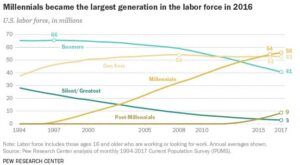We have hit an inflection point. The Millennial Generation is now the majority workforce. Why is this a big deal for organizations? Are these young adults in their 20s & 30s truly different from the previous generations or is the media overhyping this changeover?

I am uniquely positioned to comment on this topic. As a millennial myself, I lead a talent acquisition firm that places hundreds of jobseekers nationwide every year. Engaging and convincing candidates for opportunities is the name of the game. Yet the strategies that worked at the start of my tenure 6 years ago versus today has changed quite a bit. A significant reason is that we submit a much greater proportion of millennial profiles today. In order to attract young talent to our clients’ requirements, we must correctly gauge what they prioritize in their career goals.
As more and more Baby Boomers reach retirement, millennials will climb up the corporate ladder to fill vacancies. In fact, Deloitte’s recent survey shows that 20% of millennials hold leadership roles already and that will only continue to grow. Millennials have a huge influence on the work environment and are beginning to write the rulebook. For example, millennials strongly advocate for policies that push for diversity and inclusion in the workplace. This is likely because we are the most racially diverse generation in US history with 30% non-white millennials. The employer brand matters more to millennials as well. An organization’s vision and mission statement play an important deciding factor in where millennials choose to work. 61% of millennials are worried about the state of the world and feel personally responsible for making a difference. Millennials expect workplace flexibility and do not like to adhere to a strict 9-5 schedule. Their rationale is that they are tech savvy and “plugged in” at all times regardless of where they are located.
One common perception is that millennials are fickle, that they like to hop from job to job at the drop of a pin. As a result, many organizations avoid hiring young talent. But how can you compare generational classes within the same time period when their age ranges differ by decades? Of course, the 28-year-old novice who is tied down with less responsibilities and uncertain about his or her career pursuits will be less stable than the 53-year-old who has settled into a suitable career. Rather, if we control for age and then compare job tenure durations, then surprisingly enough, millennials actually stick around longer than Gen X according to the Pew Research Center. This misconception is causing many companies to miss out on the critical opportunity of low-cost fresh talent.
Recognizing these realities about millennial workforce expectations is necessary for a successful talent acquisition program. We actively listen to our millennial consultants to understand what excites them when searching for their next gig. On the flipside, we strive to educate our customers about such transformations in the workforce and how they can best navigate them.
– Akshay Gupta

